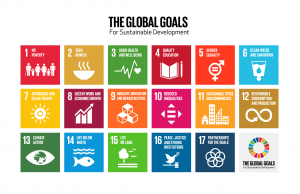We all communicate, from pitch and meeting to a session with a patient, client or colleague. Would you like to communicate more effectively and self-consciously? In this minor you will learn how to be more compassionate and connecting in communication. Also, you will learn about other mindfulness topics relevant to your (future) professional practice such as coping with stress, time management and personal leadership. You will work in small groups, together with students from different study programs and nationalities.

Admission
There are no specific admission requirements. You don’t need an internship or workplace to be able to follow this minor. The minor is a full-time minor.
If there are any contra-indications it could be wise not to take part in this minor. When in doubt, please contact the coordinator of this minor: evelyn.bekooij-westerhoudt@hu.nl
The Examination Board determines which minors do not have a higher professional education level and/or have an unacceptable overlap with the compulsory curriculum of your own study programme. Check at the page Not allowed minor courses under your institute which minors are not allowed. This page will be updated from 29 February 2024 for the 2024-2025 minor offer.
Content
Mindfulness is about consciousness: to be aware of the moment, the people around you and your own feelings. Mindful communication means: to communicate effectively by being attentive, present and accepting. For example in a meeting or in a one-on-one conversation. This minor is relevant for you, whatever your field of study is, as you will need to communicate in all professions.

The programme of this minor can also be attended in the Dutch minor ‘Mindful Communiceren
Learning outcomes
The minor Mindful Communication is practically oriented. You will:
- exercise mindfulness and the principles of Non Violent Communication both during and outside the lessons;
- learn to analyse your own behaviour and (learning) experiences, report on this and improve your behaviour;
- learn to relate mindfulness topics to your own workfield and show that mindfulness has an obvious surplus value when it comes to exercising your profession;
- learn to analyse relevant mindfulness topics, theories and views, the philosophy of mindfulness and the model of Non Violent Communication;
- develop an inspiring product which can be applied and used in an easy way, meant for professionals in your workfield.

Courses
Fundamentals of Mindfulness
Introduction to ideas of philosophers and spiritual thinkers from East and West who can be associated to mindfulness. You will also pay attention to mindfulness topics relevant to the professional practice such as coping with stress, time management, information overload, leadership and compassion. Each meeting lasts 2,5 hours.
Mindful Communication 1
You will learn to speak, listen, give feedback, manage conflicts, give presentations and collaborate in a mindful way. This course has been designed as a training. You will have a weekly training of 3 hours.
Mindfulness Based Stress Reduction 1
You will receive a condensed version of the Mindfulness Based Stress Reduction (MBSR)-training. This weekly training of 3 hours provides you with the basics of mindfulness. You will learn to apply this by doing daily meditations and basic movement exercises, reflect in diary exercises and through psychological education.
Mindful Communication 2
This course is a sequel to Mindful Communication 1. You will elaborate more on mindful communication through a diverse set of themes such as assertiveness, guilt, shame, core qualities, drama triangle and communicating in a compassionate way. Or: compassion in (inter)action. You will have a weekly training which lasts 3 hours.
Mindfulness Based Stress Reduction 2
You will elaborate more on mindfulness through the theme of (self)compassion, or: compassion in your life. The programme consists of 7 weekly meetings which last 3 hours. All meetings comprise practice (meditations, basic movement exercises); reflection; theory and a practical link to your daily life, study and (future) profession.
Professional Practice
You will research how you can contribute to the development of your own (future) profession and workfield, seen from the perspective of mindfulness and connecting communication. Then you will further elaborate your ideas in a practical product. The programme consists of 7 weekly meetings, partially intervision, which each last 3 hours.
Since the courses are highly experiential attendance is mandatory.
Assessment
You will write one or more papers for each course. At the end of both blocks you will have to take an (oral) assessment.
Literature
The following literature will be used within the minor. Other non-mandatory books will be recommended.
- Erik van der Brink, Frits Koster (2018). A Practical Guide to Mindfulness-Based Compassionate Living: Living with heart. Publisher: Routledge, Taylor & Francis Ltd.
- Justine Mol, (2017). The Giraffe and Jackal Within: About Nonviolent Communication. Amsterdam: SWP publishing house.
- Marshall B. Rosenberg (2015). Non violent communication, A language of life (3rd edition). Puddle Dancer Press.
- Mark Williams & Danny Penman (2011). Mindfulness. A practical guide to finding peace in a frantic world. Little, Brown Book Group.
Schedule
Average contact time is 3 half days a week, scheduled in 2 or 3 days. Schedule and course days will be announced shortly before the minor will start.
With the exception of the first teaching period of the academic year (starting September), the lesson and test schedules are always posted on Mijn Rooster four weeks before the start of each teaching period. The schedule for the first teaching period of the academic year can be found on the site three weeks before the start. The most up-to-date schedule is always visible on Mijn Rooster.
At HU, full-time education may be scheduled between 08:30 and 19:00.
Additional costs
None.

This minor course is marked by the Green Office as a sustainable minor. This means that by participating in this minor course, you can contribute to one or more of the Sustainable Development Goals from the UN.